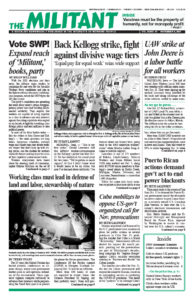Determined to prevent a return to military rule, tens of thousands took to the streets across Sudan to protest a coup by Gen. Abdel Fattah al-Burhan Oct. 25.
“Don’t give your back to the army, the army won’t protect you,” chanted demonstrators. Strikes broke out among miners and other workers and calls for a general strike were played over mosque loudspeakers.
Demonstrators had protested in Khartoum a few days earlier warning against the prospects of the military seizing power. To enforce his takeover, al-Burhan arrested Prime Minister Abdalla Hamdock, declared a state of emergency, announced the dissolution of all trade unions and cut off the internet.
In 2019, weeks of street battles and strikes brought together working people from different national and religious backgrounds to topple the decadeslong rule of President Omar Hassan al-Bashir. The protests were triggered by price hikes and fueled by the deadly impact of a civil war waged by al-Bashir on the country’s ethnic minorities and years of suppression of political rights.
Al-Burhan’s coup ousted the Sovereign Council, a joint military and civilian body established to replace al-Bashir. Military chiefs were due to hand over their leadership of the council in coming months, part of an agreement that was supposed to end with their complete withdrawal from government.
In June the International Monetary Fund announced a deal with Hamdock to wipe out $50 billion of the government’s debt in exchange for ending subsidies to working people that make it possible to get ahold of essentials. Shortages of wheat, fuel and medicines are forecast with annual inflation hitting 400%.
Further mass protests against the coup are planned for Oct. 30.

